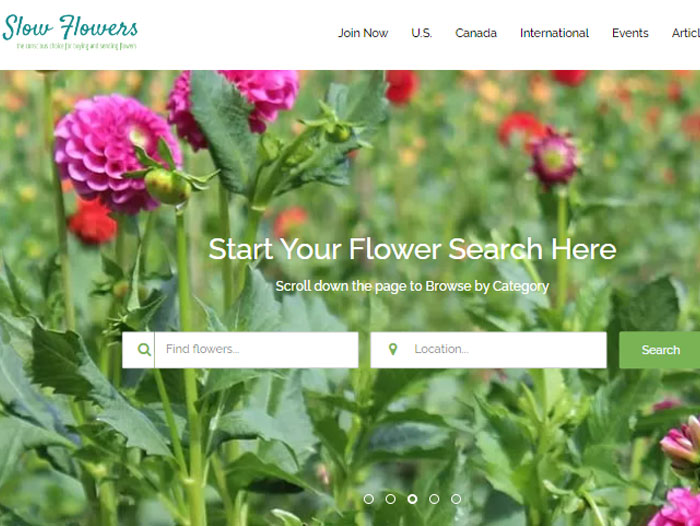Slow Flowers Society Celebrates 10th Anniversary of SlowFlowers.com
May 9, 2024 | 4 min to read
In its ten years since launch, Slowflowers.com, founded by Debra Prinzing, has grown from over 200 listings to more than 750, emphasizing the importance of transparency in floral sourcing. With findings from the 2023 National Garden Survey indicating that 63 percent of consumers value locally-grown flowers, Prinzing notes a significant rise in awareness and interest in sustainable floral choices. The site now serves as a hub for the Slow Flowers Society, promoting a consciousness around domestic flower sourcing.

Launched in 2014, the free online directory to florists, shops, studios, and farms has expanded to 750 members and hosts multiple channels, campaigns, and live, in-person events
SEATTLE, WA – One decade ago, journalist and local flower advocate Debra Prinzing launched Slowflowers.com as a free online directory designed as a one-stop destination to help shoppers find American-grown bouquets and blooms – and to be assured of the origins of each stem they purchase. The site debuted with 200-plus listings across the U.S.
Today, Slowflowers.com features more than 750 listings, representing professionals across all facets of the North American floral marketplace. In celebrating the 10-year anniversary of the site’s launch, Prinzing says she continues to be motivated by its original mission: To connect consumers with the sources of their flowers.
“When we began, country of origin labeling in the floral marketplace was quite rare,” she observes. “Transparency in floral labeling is more important today than ever. We know that the majority of flower lovers want to do the right thing and make sustainable choices in their purchases. And Slowflowers.com is a proven and credible tool that helps them do that.”
Having creating the term “Slow Flowers” with the publication of her book, Slow Flowers (2013, St. Lynn’s Press), Prinzing founded the Slow Flowers Movement, a conversation about sustainability and flower sourcing that has inspired florists and flower farmers alike. “Ten years ago, we were faced with the reality that only 20 percent of cut flowers sold in the U.S. are grown here. And that number has not changed much,” she says. “What has changed, however, is the proliferation of floral entrepreneurs, small-scale growers, farmer-florists, and regional flower-selling hubs across the U.S. and Canada – shifts that have been widely emulated in other countries.”
Prinzing cites findings from the 2023 National Garden Survey, which Slow Flowers Society helps to sponsor. The survey found that 63 percent of respondents indicate locally-grown flowers are very or somewhat important when they purchase cut flowers and arrangements. Additionally, 59% of respondents say that domestic U.S. flowers are very or somewhat important to them.
“We continue to track increases in consumer awareness related to flower sourcing, buying behavior, and attitudes, both through Slow Flowers Society’s efforts and in partnership with the NGS,” she continues. “These findings reveal the importance of the Slow Flowers Movement as it has helped change the marketplace over the past decade.”
The directory is now one channel of Slow Flowers Society, a multifaceted membership organization that provides a highly-recognized branding and marketing platform, as well as editorial projects, virtual floral promotions, and in-person educational events.
To celebrate Slowflowers.com’s 10th Anniversary, Prinzing announced the beginning of a month-long series of special guests, promotional packages, and new educational resources for members and the larger floral profession.
About:
Debra Prinzing is a Seattle-based writer, speaker and leading advocate for domestic and locally-grown flowers. Through Slow Flowers Society’s many channels and programs she has convened a national conversation that encourages consumers and professionals alike to make conscious choices about their floral purchases. Debra is the producer of SlowFlowers.com, the weekly “Slow Flowers Podcast” and the American Flowers Week (June 28-July 4) campaign. She is author of 12 books, including The 50 Mile Bouquet and Slow Flowers Journal. Her newest book is Where We Bloom (BLOOM Imprint, 2021).
Use Promo Code: HAPPY10
Receive 50% off Slow Flowers Membership
(offer expires June 7, 2024)
